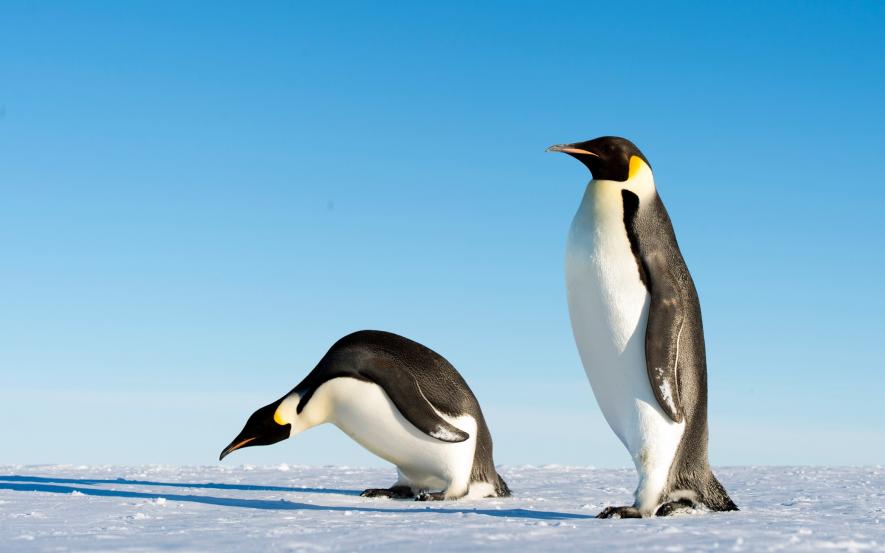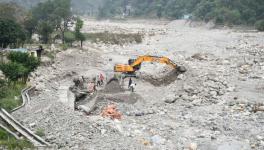Breeding Failure of Emperor Penguins Illustrates Visible Impact of Climate Change in Antarctica

Image credit: Wikimedia Commons
The Emperor Penguin is the renowned symbol of Antarctica, a majestic bird that relies solely on sea ice for its life cycle. Global warming and the resulting climate change have affected the ice extent over Antarctica, resulting in its abrupt reduction. This, in turn, can have a profound impact on the fragile ecosystem of the region and also on the species that depend on ice for breeding, moulting, or foraging.
The latest research published in the journal Nature on August 24 has revealed that due to the record low level of ice content in Antarctica in 2022, Emperor penguins had to face total breeding failure in four out of five breeding sites in the region. The study suggests that at the four breeding sites, the breaking up of the sea ice occurred before the start of the fledging period in the breeding season. The fledging period in birds signifies the time from hatching until the chicks are capable of flight.
This is the first instance of recorded breeding failure of Emperor penguins due to the decrease in sea ice content in Antarctica. Sea ice extent has varied from time to time, and there have been prior instances where colonies have failed to breed. However, "If a whole region becomes unsuitable, penguins will find it difficult to locate an alternate spot," commented Annie Schmidt in a Science article about the research by Erik Stokstad. Schmidt is a seabird ecologist at Blue Conservation Science.
On a similar note as Schmidt, another ecologist, Gerald Kooyman from the Scripps Institution of Oceanography, was quoted in the same Science article, saying, "The sea ice in this area may become so unreliable that the colonies will disappear over the next few years. I think we’re past the tipping point for these colonies."
The British Antarctic Survey, which led the study, has been engaged in monitoring penguins in Antarctica with the help of satellites for the past 15 years. The study's lead author, Peter Fretwell, from the organisation, and his colleagues detected sea ice breaking in some places by late October. This proves disastrous for the Emperor penguins as it directly disrupts their life cycle.
The Emperor penguins arrive at the breeding sites during March and April, and their chicks hatch between September and October. They mature by December and January. If sea ice breaking takes place before the chicks reach their fledging period, then they will drown or freeze. The ice-breaking during October is thus a disaster.
The study found that penguins left one of the breeding sites by late October and later fled from three other sites by early December. The only colony that remained was found on Rothschild Island, situated to the far north. Here, they could successfully raise their chicks. The study authors wrote that the lowest extent of ice was found in the central and eastern Bellingshausen Sea region, west of the Antarctic Peninsula. In some regions there, a 100% loss of sea ice was observed.
There have been previous studies as well depicting the link between Emperor penguins' demography and sea ice loss due to climate change. The loss of breeding sites due to sea ice loss has also been observed previously.
However, the Bellingshausen Sea colonies of the penguins, with around 10,000 breeding pairs, constitute a small fraction of the total population of the species, estimated to be around 1,50,000 breeding pairs. According to Schmidt, this single event is not going to wipe out the species from Antarctica. Emperor penguins have a lifespan of 20 years, and within that time, they can breed again. However, the findings provide early hints of the impact of global warming and climate change on Antarctic species. Fretwell believes that this year may be equally devastating for the five colonies.
Notably, the penguins have never faced large-scale hunting, habitat loss, overfishing, or other anthropogenic factors at the local level. For this reason, "climate change is considered the only major driver of their long-term population change," wrote the study authors of the latest research.
Get the latest reports & analysis with people's perspective on Protests, movements & deep analytical videos, discussions of the current affairs in your Telegram app. Subscribe to NewsClick's Telegram channel & get Real-Time updates on stories, as they get published on our website.
























